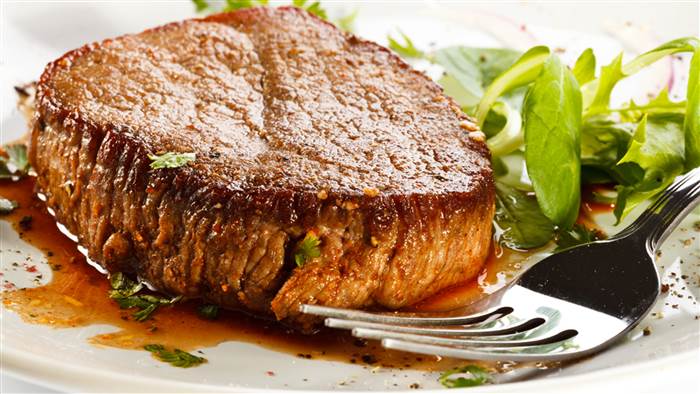There’s no denying the fact that reducing your carbohydrate intake and eating copious amounts of fat will transform your health and body composition; especially if you’re experiencing any symptoms of metabolic derangement (insulin resistance, obesity). And it’s nice to see this information finally hitting the mainstream – as we’ve been pretty much forced to do the opposite since the late 70’s when the dietary guidelines turned saturated fat into a villain.
But to go and call this eating regimen a high-fat diet is somewhat misleading. Because despite the fact that it’s a high-fat diet when looking at calories, the majority of the population doesn’t look at it that way.
People see food the way it appears on their plate, not the way you analyze it in your lab; and realistically, they associate meat with protein and fat with butter. So telling them to ‘choose fat first,’ or ‘eat more fat’ isn’t really getting them any closer to the results they’re after.

What’s worse, is that we now have low-carb advocates telling people to eat less protein….?
Why? So we can turn into the same skinny-fat folks juicing and starving themselves into skinny jeans?
As discussed in Live It NOT Diet!, the food people need to associate with priority is animal protein. Since this is how you build and maintain muscle (1, 2), and this is how you avoid the sarcopenia and reduced metabolic rate associated with aging. Especially if you’re in a caloric deficit (1, 2, 3, 4) – which tends to naturally occur on a low-carbohydrate plan (1, 2, 3) – and especially if you’re not weight-training – which unfortunately tends to be the norm.
Restricting protein for some unproven longevity benefit is the epitome of choosing LIFEspan over HEALTHspan.
Moreover, this is how you stay satiated between meals, and increase your fat burning rate. Since protein is digested slower (keeping the belly full), and has a greater thermic effect (elevating our metabolic rate) than any other macronutrient (1, 2, 3). With some even suggesting that this is why low-carb works so well (1, 2).
Lastly, any excess protein not used for muscle, tissue and hormones is burned as fuel, not stored as fat (even when it’s extremely excessive – 4.4g/kg). And overeating it in the first place is extremely difficult. Since unlike carbohydrates and fat, our body knows pretty quickly when we’ve had enough solid protein (and force-feeding is often required to reach an excess).
In other words, people are going to do better (sustainability wise), and look better (buck naked wise), on what they perceive as a high-protein, low-carbohydrate diet. Which means consciously choosing to eat more meat, and using butter or coconut oil to cook or flavor with. Not consciously choosing to eat more scoops of butter or coconut oil….
…for breakfast.

Calorie-wise they’re still going to end up eating a high-fat diet, but there’s no need to call it that. And there’s definitely no need to restrict protein!
Or advise restricting protein!!
Frankly, we’re already eating a low-protein diet compared to our hunter-gatherer predecessors (even when we prioritize it!). The same hunter-gatherers that remained disease-free, without the hospitals, medication, and other so-called health-care conveniences of modern living.
“…we are descended from those who were made more, not less, healthy by eating red meat; and we carry their genes.” –Richard Young
So, not sure where these low-carb, low-protein recommendations are coming from, but it sounds like they’ve got their nose in the book of T. Colin Campbell. Since observational studies on mTOR or IGF-1 tell us nothing, and no one drinks that many protein shakes and eats that much cheese (20%+ of calories) for casein to be the problem they’re making it out to be.
Likewise, insulin and blood sugar from animal protein should be the least of our worries (1, 2, 3, 4), given that the same low-carb diets improving glycemic control are HIGH in protein (1, 2, 3, 4, 5).
In this study from 2004 in the journal Diabetes, men with type 2 diabetes following a moderately low-carb (100g) very high protein (200g) diet improved glucose, insulin and HbA1c levels significantly after 5 weeks.

Similar to our discussions in the past, it seems the occasional 24hr+ fast is a better way to experience any long-term health benefits associated with less calories or less protein (1, 2)…not a daily one. And if methionine, the amino acid in muscle meat, really is an issue (for mice) in excessive doses (1, 2, 3), there’s no reason why we can’t balance this with glycine-rich bone broth and organ meats, or even supplementation.
But more importantly, consuming less carbohydrates in the first place is the best way to starve cancer and prevent disease. And like it or not, eating more protein is one of the key’s to making this carbohydrate reduction possible.
Stay Lean!
Coach Mike
RELATED ARTICLES:
Are You Eating Enough Protein?
The 3 Ways to Prevent Muscle Loss
